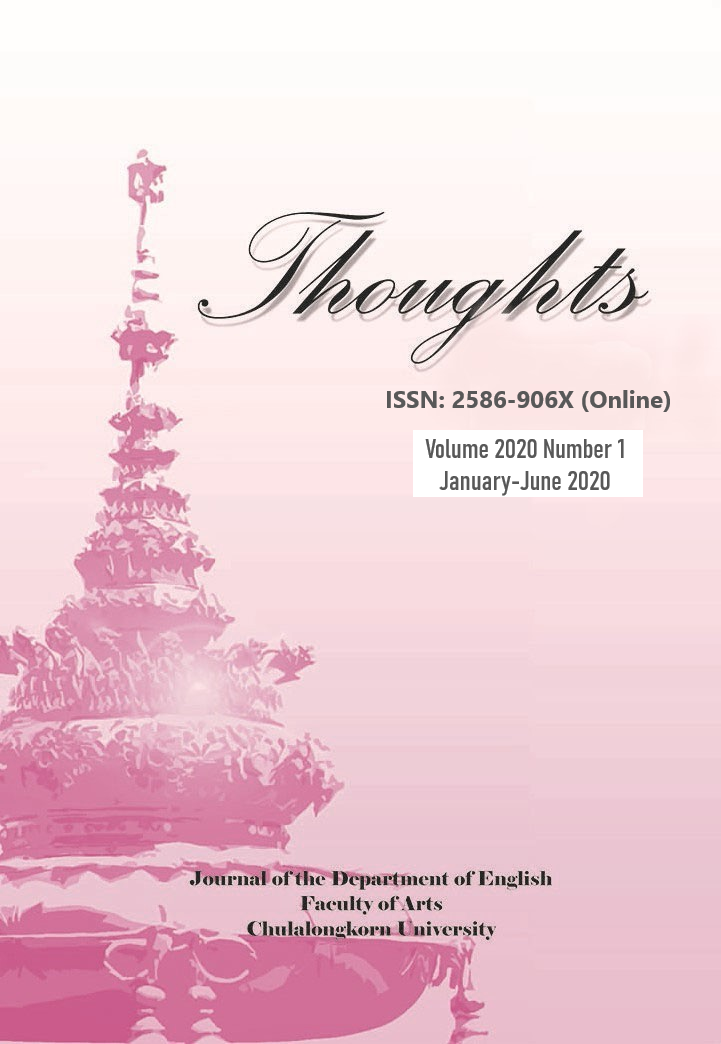Utopian Desire and Critical Dystopia in Kazuo Ishiguro’s Never Let Me Go and Cormac McCarthy’s The Road
DOI:
https://doi.org/10.58837/CHULA.THTS.2020.1.2Keywords:
Critical Dystopia, Utopia, Utopian Desire, The Road, Never Let Me GoAbstract
This paper examines McCarthy’s The Road and Ishiguro’s Never Let Me Go and argues that the two novels exhibit crucial characteristics of critical dystopia and utopian desire as conceptualized by Lyman Tower Sargent and Ildney Cavalcanti. Key characteristics of critical dystopia as discerned in the two works include the attempt to critique conditions of our contemporary world as well as offer better alternatives, the utilization of genre mixing, and the embodiment of open-endedness or the resistance to closure that aims at critically engaging the reader. The investigation reveals that in both novels utopia manifests itself as a desire that triggers a process towards better ways of being and the exploration of alternatives, rather than a blueprint for an ideal society. Significantly, utopianism in both novels is intrinsically a mode of writing that seeks to transform our way of thinking, as the reader is encouraged to become a desiring or a dissatisfied subject who has to formulate her/his utopia. The act of reading is thus crucial to the utopianism of both novels and a great deal of faith is placed on storytelling as a means to trigger the utopian desire and process.
References
Baccolini, R.,& Moylan, T. (2003). Dark horizons: Science fiction and the dystopian imagination.Routledge.
De Bruyn, B. (2010). Borrowed time, borrowed world and borrowed eyes: Care, ruin, and vision in Mccarthy’s The Roadand Harrison’s ecocriticism. English Studies, 91(7), 776-789. https://doi.org/10.1080/0013838X. 2010.518045
Cavalcanti, I. (2003). The writing of utopia and the feminist critical dystopias. In R. Baccolini,& T. Moylan (Eds.), Dark horizons: Science fiction and the dystopian imagination (pp. 47-67). Routledge.
Cooper, L. (2011). Cormac McCarthy’s The Road as apocalyptic grail narrative. Studies in the Novel, 43(2), 218-236. http://doi.org/10.1353/sdn.2011.0032
Donawerth, J. (2003).Genre blurring and the critical dystopia. In R. Baccolini,& T. Moylan (Eds.), Dark horizons: Science fiction and the dystopian imagination (pp. 29-46). Routledge.
Dorson, J. (2017). Cormac McCarthy and the genre turn in contemporary literary fiction. European Journal of American Studies, 12(3). https://doi.org/10.4000/ejas.12291
Johns-Putra. A. (2016). “My job is to take care of you”: Climate change, humanity, and Cormac McCarthy’s The Road. MFS Modern Fiction Studies, 62(3), 519-540. http://doi.org/10.1353/mfs.2016.0041
Ishiguro, K. (2010). Never Let Me Go (Movie Tie-In edition).Faber and Faber.
Levitas, R. (2013). Utopia as a method: The imaginary reconstitution of society.Palgrave Macmillan.
Levy, T. (2011). Human rights storytelling and trauma narrative in Kazuo Ishiguro’s Never Let Me Go. Journal of Human Rights, 10(1), 1-16. https://doi.org/10.1080/14754835.2011.546242
Liénard-Yeterian, M. (2016). Gothic trouble: Cormac McCarthy’s The Road and the globalized order. Text Matters, 6(6), 144-158.https://doi.org/10.1515/texmat-2016-0009
Moylan, T. (2000). Scraps of the untainted sky: Science fiction, utopia, dystopia. Westview Press.
McCarthy, C. (2007). The Road.Picador.
McDonald, K. (2007). Days of past futures: Kazuo Ishiguro’s Never Let Me Go as “speculative memoir”.Biography 30(1):74-83. https://doi.org/10.1353/ bio.2007.0025
Sargent, L. T. (2001). US eutopias in the 1980s and 1990s: Self-fashioning in a world of multiple identities. In P.Spinozzi (Ed.), Utopianism/literary utopias and national cultural identities: A comparative perspective (pp.221-232). University of Bologna.
Sargisson, L. (2003). Utopia in dark times: Optimism/Pessimism and Utopia/Dystopia. In R. Baccolini, & T. Moylan (Eds.), Dark horizons: Science fiction and the dystopian imagination (pp.13-27). Routledge.
Shaddox, K. (2013). Generic Considerations in Cormac McCarthy’s Never Let Me Go. Human Rights Quarterly, 35(2), 448-469. http://doi.org/10.1353/hrq.2013.0026
Tsao, T. (2012). The tyranny of purpose: Religion and biotechnology in Kazuo Ishiguro’s “Never Let Me Go”. Literature & Theology, 26(2), 214-232. https://www.jstor.org/stable/23927483
Wielenberg, E. J. (2010). God, morality, and meaning in Cormac McCarthy’s The Road. Cormac McCarthy Journal, 8(1), 1-19. https://www.bishopmanogue.org/wp-content/uploads/2017/05/11-H-God-Morality-and-Meaning-.pdf
White, C. T. (2015). Embodied reading and narrative empathy in Cormac McCarthy’s The Road. Studies in the Novel, 47(4), 532-549. http://doi.org/10.1353/sdn.2015.0046
Whitehead, A. (2011). Writing with care: Kazuo Ishiguro's “Never Let Me Go”. Contemporary Literature, 52(1), 54-83. www.jstor.org/stable/41261825
Downloads
Published
Issue
Section
License
Copyright (c) 2020 Thoughts

This work is licensed under a Creative Commons Attribution-NonCommercial-NoDerivatives 4.0 International License.
Copyright by the Faculty of Arts, Chulalongkorn University.
Photocopying is allowed for internal, non-commercial use only. Photocopying for other uses or for purposes other than indicated must be permitted in writing from the Faculty of Arts, Chulalongkorn University.
All views or conclusion are those of the authors of the articles and not necessarily those of the publisher or the editorial staff.


